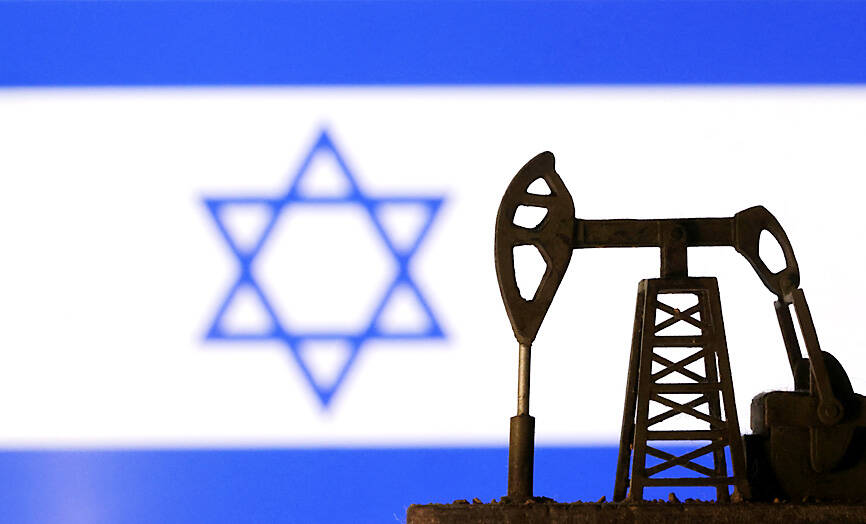Oil prices rallied while the US dollar and yen advanced yesterday after Hamas launched a shock attack on Israel at the weekend, sparking fresh concerns about tensions in the Middle East.
The crisis fanned concerns about supplies of crude oil from the region as supply worries are already high, owing largely to Saudi Arabian and Russian output cuts.
Oil prices had eased back from highs of the mid-US$90 range last month in the past few days, falling sharply last week. Early yesterday, US benchmark crude oil was up US$2.70 at US$85.48 per barrel in electronic trading on the New York Mercantile Exchange. It picked up US$0.48 on Friday.

Photo: Reuters
Brent crude, the pricing basis for international trading, advanced US$2.42 per barrel to US$87.00 per barrel.
Rising oil prices have also renewed fears about the impact on inflation, with energy costs a key driver of spiking prices, giving a fresh headache to central banks as they try to ease up on interest rate hikes to avoid recessions.
CONTAINED OR SPREADS
“Key for markets is whether the conflict remains contained or spreads to involve other regions, particularly Saudi Arabia,” Australia & New Zealand Banking Group commodity strategists Brian Martin and Daniel Hynes said. “Initially at least, it seems markets will assume the situation will remain limited in scope, duration, and oil-price consequences. But higher volatility can be expected.”
However, SPI Asset Management managing partner Stephen Innes said that: “historical analysis suggests that oil prices tend to experience sustained gains after the Middle East crises.”
“Meanwhile, stocks tend to eventually recover and trend higher after an initial period of volatility. Safe-haven assets like gold and Treasuries, which initially see gains during such crises, tend to fade from their initial price spikes as the situation stabilizes,” he added.
A decidedly risk-off mood also saw investors push into the safety of the US dollar, which was up against the British pound and euro, as well as the Australian and New Zealand dollars.
The yen, considered one of the safest currencies, strengthened against the greenback, although it still remains locked around 11-month lows.
Gold, another key haven, gained around 1 percent.
Equity markets were mixed, with Shanghai dropping on its first day back after a week-long holiday as investors continue to fret over the stuttering Chinese economy.
There were also losses in Mumbai, Singapore, Manila, Bangkok and Wellington, although Hong Kong rose in shortened trade, having been closed in the morning owing to a typhoon.
Sydney and Jakarta eked out gains, while Taipei and Tokyo were closed for holidays.
London edged up, while Paris and Frankfurt were lower. The futures for the S&P 500 and the Dow also lost ground yesterday.
Additional reporting by AP

DIVIDED VIEWS: Although the Fed agreed on holding rates steady, some officials see no rate cuts for this year, while 10 policymakers foresee two or more cuts There are a lot of unknowns about the outlook for the economy and interest rates, but US Federal Reserve Chair Jerome Powell signaled at least one thing seems certain: Higher prices are coming. Fed policymakers voted unanimously to hold interest rates steady at a range of 4.25 percent to 4.50 percent for a fourth straight meeting on Wednesday, as they await clarity on whether tariffs would leave a one-time or more lasting mark on inflation. Powell said it is still unclear how much of the bill would fall on the shoulders of consumers, but he expects to learn more about tariffs

NOT JUSTIFIED: The bank’s governor said there would only be a rate cut if inflation falls below 1.5% and economic conditions deteriorate, which have not been detected The central bank yesterday kept its key interest rates unchanged for a fifth consecutive quarter, aligning with market expectations, while slightly lowering its inflation outlook amid signs of cooling price pressures. The move came after the US Federal Reserve held rates steady overnight, despite pressure from US President Donald Trump to cut borrowing costs. Central bank board members unanimously voted to maintain the discount rate at 2 percent, the secured loan rate at 2.375 percent and the overnight lending rate at 4.25 percent. “We consider the policy decision appropriate, although it suggests tightening leaning after factoring in slackening inflation and stable GDP growth,”

Meta Platforms Inc offered US$100 million bonuses to OpenAI employees in an unsuccessful bid to poach the ChatGPT maker’s talent and strengthen its own generative artificial intelligence (AI) teams, OpenAI CEO Sam Altman has said. Facebook’s parent company — a competitor of OpenAI — also offered “giant” annual salaries exceeding US$100 million to OpenAI staffers, Altman said in an interview on the Uncapped with Jack Altman podcast released on Tuesday. “It is crazy,” Sam Altman told his brother Jack in the interview. “I’m really happy that at least so far none of our best people have decided to take them

As they zigzagged from one machine to another in the searing African sun, the workers were covered in black soot. However, the charcoal they were making is known as “green,” and backers hope it can save impoverished Chad from rampant deforestation. Chad, a vast, landlocked country of 19 million people perched at the crossroads of north and central Africa, is steadily turning to desert. It has lost more than 90 percent of its forest cover since the 1970s, hit by climate change and overexploitation of trees for household uses such as cooking, officials say. “Green charcoal” aims to protect what